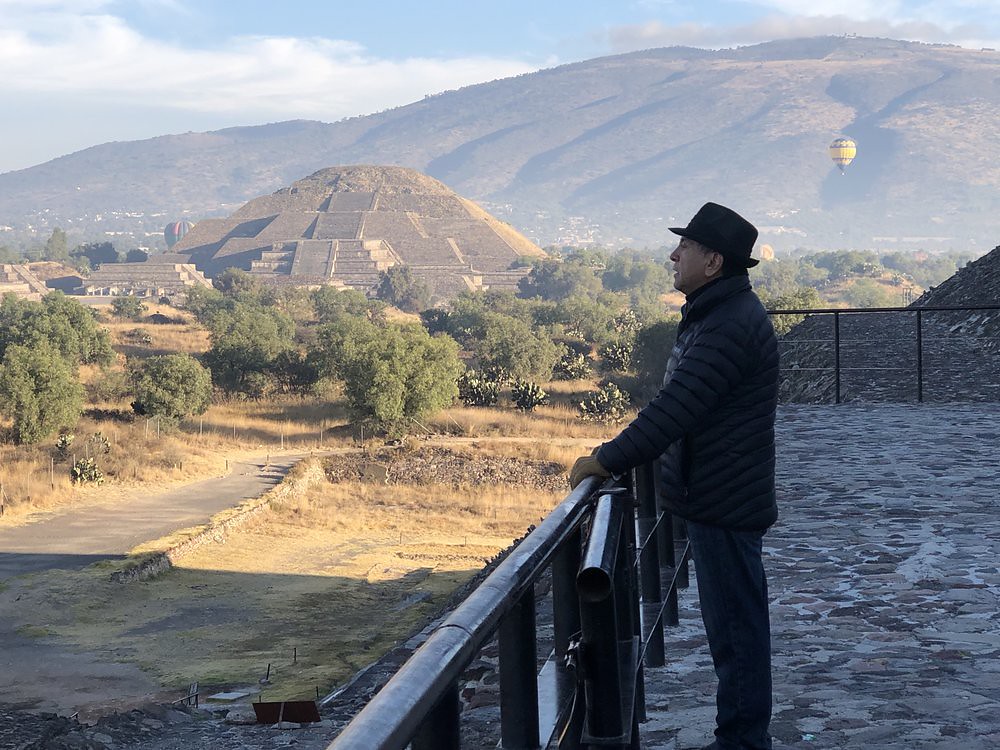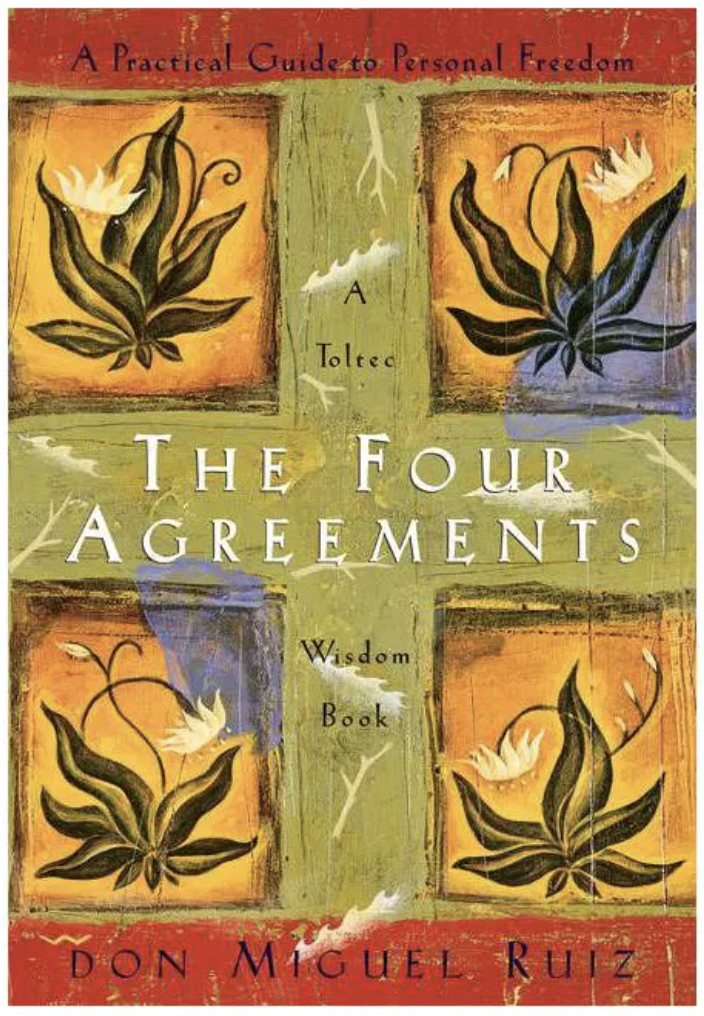“We are born with the capacity to learn how to dream,” writes Don Miguel Ruiz in his New York Times bestselling book, The Four Agreements: A Practical Guide to Personal Freedom (1997). “And the humans who live before us teach us how to dream the way society dreams.”
Explaining the impact of imparting this “dream” to children beginning at birth, he writes:
“The outside dream has so many rules that when a new human is born, we hook the child’s attention and introduce these rules into his or her mind…[b]y using our attention we learned a whole reality, a whole dream. We learned how to behave in society: what to believe and what not to believe; what is acceptable and what is not acceptable; what is good and what is bad; what is beautiful and what is ugly; what is right and what is wrong. It was all there already — all that knowledge, all those rule and concepts about how to behave in the world.”
Referring to this process as the “domestication of humans”, Ruiz explains that this “outside” information is transferred to us internally, creating our whole belief system — or “agreements” we unwittingly make — that ultimately form us into someone we’re not.
“There are thousands of agreements you have made with yourself, with other people, with your dream of life, with God, with society, with your parents, with your spouse, with your children,” he writes.
“But the most important agreements are the ones you made with yourself. In these agreements you tell yourself who you are, what you feel, what you believe, and how to behave. The result is what you call your personality. In these agreements you say, ‘This is what I am. This is what I believe. I can do certain things, and some things I cannot do. This is reality, that is fantasy; this is possible, that is impossible.’”
This whole construct is “based on false law.” Ruiz writes: “Ninety-five percent of the beliefs we have stored in our minds are nothing but lies, and we suffer because we believe all these lies.”
Drawing on ancient Toltec wisdom, Ruiz suggests that in order to live a life of joy, love, peace and fulfillment, we have to learn to break these agreements — the beliefs we have “agreed” to that are ultimately lies — and recapture our personal power.
“If we can see it is our agreements that rule over our own life, and we don’t like the dream of our life, we need to change the agreements,” he writes.
We can change these agreements by adopting new agreements, or four primary ones that he outlines in his book — a process that requires incredible repetition, discipline and practice.
Below are Ruiz’s thoughts on the second one of these agreements: “don’t take anything personally.” An incredibly difficult notion to put into practice — particularly in a culture that inflates our self-importance and value — Ruiz sheds light on the freedom and peace that can come from making it a daily discipline.
Start with this:
“Whatever happens around you, don’t take it personally…if I see you on the street and I say ‘Hey, you are so stupid,’ without knowing you, it’s not about you; it’s about me. If you take it personally, then perhaps you believe you are stupid. Maybe you think to yourself, ‘How does he know? Is he clairvoyant, or can everybody see how stupid I am?’”
Taking things personally means we are agreeing with whatever is said:
“You take it personally because you agree with whatever was said. As soon as you agree, the poison goes through you, and you are trapped in the dream of hell. What causes you to be trapped is what we call personal importance. Personal importance, or taking things personally, is the maximum expression of selfishness because we make the assumption that everything is about ‘me.’”
What other people say or do actually has nothing to do with us:
“Nothing other people do is because of you. It is because of themselves. All people live in their own dream, in their own mind; they are in a completely different world from the one we live in. When we take something personally, we make the assumption that they know what is in our world, and we try to impose our world on their world.”
Even when it feels personal:
“Even when a situation seems so personal, even if others insult you directly, it has nothing to do with you. What they say, what they do, and the opinions they give are according to the agreements they have in their own minds. Their point of view comes from all the programming they received during domestication.”
Other peoples’ behavior and thoughts have everything to do with them:
“If someone gives you an opinion and says, ‘Hey, you look so fat,’ don’t take it personally, because the truth is that this person is dealing with his or her own feelings, beliefs, and opinions. That person tried to send poison to you and if you take it personally, then you take that poison and it comes yours. Taking things personally makes you easy prey for these predators, the black magicians. They can hook you easily with one little opinion and feed you whatever poison they want, and because you take it personally, you eat it up.”
[…]
“You eat all their emotional garbage, and now it becomes your garbage. But if you do not take it personally, you are immune in the middle of hell. Immunity to poison in the middle of hell is the gift of this agreement.”
Whether someone says something positive or negative, we shouldn’t take it personally — because it doesn’t have to do with us!:
“It is not important to me what you think about me, and I don’t take what you think personally. I don’t take it personally when people say, ‘Miguel, you are the best,’ and I also don’t take it personally when they say, ‘Miguel, you are the worst.’ I know that when you are happy you will tell me, ‘Miguel, you are such an angel!’ But, when you are mad at me you will say, ‘Oh, Miguel, you are such a devil! You are so disgusting. How can you say those things?’ Either way, it does not affect me because I know what I am. I don’t have the need to be accepted. I don’t have the need to have someone tell me, ‘Miguel, you are doing so good!’ or ‘How dare you do that!’”
In other words, we can say to ourselves:
“Whatever you think, whatever you feel, I know is your problem and not my problem. It is the way you see the world. It is nothing personal, because you are dealing with yourself, not with me. Others are going to have their own opinion according to their belief system, so nothing they think about me is really about me, but it is about them.”

For example:
“You may even tell me, ‘Miguel, what you are saying is hurting me.’ But it is not what I am saying that is hurting you; it is that you have wounds that I touch by what I have said. You are hurting yourself. There is no way I can take this personally. Not because I don’t believe in you or don’t trust you, but because I know that you see the world with different eyes, with your eyes. You create an entire picture or movie in your mind, and in that picture you are the director, you are the producer, you are the main actor or actress. Everyone else is a secondary actor or actress. It is your movie.”
Again, good or bad, it is never about us — even in the most extreme circumstances:
“Whatever people do, feel, think, or say, don’t take it personally. If they tell you how wonderful you are, they are not saying that because of you. You know you are wonderful. It is not necessary to believe other people who tell you that you are wonderful. Don’t take anything personally. Even if someone got a gun and shot you in the head, it was nothing personal. Even at that extreme.”
Even our own opinions about ourselves aren’t necessarily true:
“Even the opinions you have about yourself are not necessarily true; therefore, you don’t need to take whatever you hear in your own mind personally. The mind has the ability to talk to itself, but it also has the ability to hear information that is available from other realms. Sometimes you hear a voice in your mind, and you may wonder where it came from. This voice may have come from another reality in which there are living beings very similar to the human mind.”
Our mind is complex and can deceive us:
“The mind lives in more than one dimension. There may be times when you have ideas that don’t originate in your mind, but you are perceiving them with your mind. You have the right to believe or not believe these voices and the right not to take what they say personally. We have a choice whether or not to believe the voices we hear within our own minds, just as we have a choice of what to believe and agree with in the dream of the planet.”
All of the agreements we have unwittingly made are continually firing off, and sometimes they even conflict with each other:
“It is a big problem when a thousand parts of your mind are all speaking at the same time. This is called a mitote…[t]he mitote can be compared to a huge marketplace where thousands of people are talking and bartering at the same time. Each one has different thoughts and feelings; each one has a different point of view. The programming in the mind — all of those agreements we have made — are not necessarily compatible with each other. Every agreement is like a separate living being; it has its own personality and its own voice. There are conflicting agreements that go against other agreements and on and on until it becomes a big ware in the mind. The mitote is the reason humans hardly know what they want, how they want it, or when they want it. They don’t agree with themselves because there are parts of the mind that want one thing, and other parts that want exactly the opposite.”
It helps if we can learn to develop the awareness of these conflicting agreements:
“Some part of the mind has objections to certain thoughts and actions, and another part supports the actions of the opposing thoughts. All these little living beings create inner conflict because they are alive and they each have a voice. Only by making an inventory of our agreements will we uncover all of the conflicts in the mind and eventually make order out of the chaos of mitote.”
Taking things personally often leads to suffering:
“Don’t take anything personally because by taking things personally you set yourself up to suffer for nothing. Humans are addicted to suffering at different levels and to different degrees, and we support each other in maintaining these addictions.”
Not taking things personally leads to freedom:
“There is a huge amount of freedom that comes to you when you take nothing personally…[t]he whole world can gossip about you, and if you don’t take it personally you are immune. Someone can intentionally send emotional poison, and if you don’t take it personally, you will not eat it. When you don’t take the emotion poison, it becomes even worse in the sender, but not in you.”
It helps us break all those other faulty agreements swirling in our minds:
“Taking nothing personally helps you to break many habits and routines that trap you in the dream of hell and cause needless suffering. Just by practicing this second agreement you begin to break dozens of teeny, tiny agreements that cause you to suffer.”
And rids of us toxic emotions:
“When you make it a strong habit not to take anything personally, you avoid many upsets in your life. Your anger, jealousy, and envy will disappear, and even your sadness will simply disappear if you don’t take things personally.”
Not taking things personally is a discipline to practice:
“If you can make this second agreement a habit, you will find that nothing can put you back into hell…[w]rite this agreement on paper, and put it on your refrigerator to remind you all the time: Don’t take anything personally.”
Ultimately, it is a choice we can make — and one we will have to make, over and over and over again:
“As you make a habit of not taking anything personally, you won’t need to place your trust in what others do or say. You will only need to trust yourself to make responsible choices. You are never responsible for the actions of others; you are only responsible for you. When you truly understand this, and refuse to take things personally, you can hardly be hurt by the careless comments or actions of others.”
Similar posts:
- Epictetus on How to Live a Good, Fulfilling Life
- Epictetus on Willing What God Wills — or Doesn’t Will
- Think Carefully: Marcus Aurelius on How to Control the Mind
- Letting Go: The Bhagavad Gita on the Importance of Non-attachment
- How to Conquer Rejection — or Overcome the Fear of Being Rejected
- The Dalai Lama and Archbishop Desmond Tutu on the Four Qualities of the Mind that Lead to Joyful Living
- Gisele Bündchen on Self-Awareness, Challenging Your Thoughts and Paying Attention to Your Inner Voice
- Yielding Control: Irenaeus of Lyon on What it Means to be a Created Being
- Worry, Not: Søren Kierkegaard on What We Can Learn from the Birds of the Air and Lilies of the Field
- Saint Augustine on the Happy Life and Finding Joy



Great article Kathrine
I am struggling with the “don’t take anything personally” and the “nothing others do it because of you”.
I am dealing with a contractual matter and it appears the other party is going to REALLY stretch the facts. Much of it is simply that their memory is colored over time. They are remembering only the part that benefits them.
Anyway, I am likely going to give them what they want because I value my reputation that much. BEYOND what makes business sense.
I am taking it personally. It’s my reputation.
How am I misinterpreting?
Great article!
Thanks for your comment, Rick! I think not “taking it personally” means not letting the actions, behavior, or words of other people negatively affect us, which can be hard to do! Oftentimes, the way people behave toward us or speak to us is a reflection of their own issues, and has nothing to do with us. Of course, this isn’t always the case and sometimes people might have a personal vendetta. But I think not “taking it personally” means not giving someone else power over our own emotions.